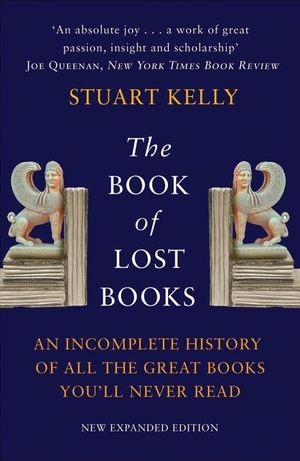The Book of Lost Books
Published by Birlinn Limited
A “clever and highly entertaining” look at books through history that were stolen, went missing, or just never got written (The New York Times).
In an age when deleted scenes from Adam Sandler movies are saved, it’s sobering to realize that some of the world’s great prose and poetry has gone missing. This witty and unique new book rectifies that wrong. Part detective story, part history, part exposé, The Book of Lost Books is the first guide to literature’s what-ifs and never-weres.
In compulsively readable fashion, this book reveals details about tantalizing vanished works by the famous, acclaimed, and influential, from the time of cave drawings to the late twentieth century. Here are true stories behind stories, poems, and plays that now exist only in imagination:
·Aristophanes’ Heracles, the Stage Manager was one of the playwright’s several spoofs that disappeared.
·Love’s Labours Won may have been a sequel to Shakespeare’s Love’s Labours Lost—or was it just an alternative title for The Taming of the Shrew?
·Jane Austen’s incomplete novel Sanditon was a critique of hypochondriacs and cures started when the author was fatally ill.
·Nikolai Gogol burned the second half of Dead Souls after a religious conversion convinced him that literature was paganism.
·Some of the thousand pages of William Burroughs’s original Naked Lunch were stolen and sold on the street by Algerian street boys.
·Sylvia Plath’s widower, Ted Hughes, claimed that the 130 pages of her second novel, perhaps based on their marriage, were lost after her death.
Whether destroyed (Socrates’ versions of Aesop’s Fables), misplaced (Malcolm Lowry’s Ultramarine, pinched from his publisher’s car), interrupted by the author’s death (Robert Louis Stevenson’s Weir of Hermiston), or simply never begun (Vladimir Nabokov’s Speak, America, a second volume of his memoirs), these missing links create a history of literature for a parallel world. Civilized, satirical, erudite yet accessible, The Book of Lost Books is a real find.
In an age when deleted scenes from Adam Sandler movies are saved, it’s sobering to realize that some of the world’s great prose and poetry has gone missing. This witty and unique new book rectifies that wrong. Part detective story, part history, part exposé, The Book of Lost Books is the first guide to literature’s what-ifs and never-weres.
In compulsively readable fashion, this book reveals details about tantalizing vanished works by the famous, acclaimed, and influential, from the time of cave drawings to the late twentieth century. Here are true stories behind stories, poems, and plays that now exist only in imagination:
·Aristophanes’ Heracles, the Stage Manager was one of the playwright’s several spoofs that disappeared.
·Love’s Labours Won may have been a sequel to Shakespeare’s Love’s Labours Lost—or was it just an alternative title for The Taming of the Shrew?
·Jane Austen’s incomplete novel Sanditon was a critique of hypochondriacs and cures started when the author was fatally ill.
·Nikolai Gogol burned the second half of Dead Souls after a religious conversion convinced him that literature was paganism.
·Some of the thousand pages of William Burroughs’s original Naked Lunch were stolen and sold on the street by Algerian street boys.
·Sylvia Plath’s widower, Ted Hughes, claimed that the 130 pages of her second novel, perhaps based on their marriage, were lost after her death.
Whether destroyed (Socrates’ versions of Aesop’s Fables), misplaced (Malcolm Lowry’s Ultramarine, pinched from his publisher’s car), interrupted by the author’s death (Robert Louis Stevenson’s Weir of Hermiston), or simply never begun (Vladimir Nabokov’s Speak, America, a second volume of his memoirs), these missing links create a history of literature for a parallel world. Civilized, satirical, erudite yet accessible, The Book of Lost Books is a real find.
BUY NOW FROM
COMMUNITY REVIEWS

